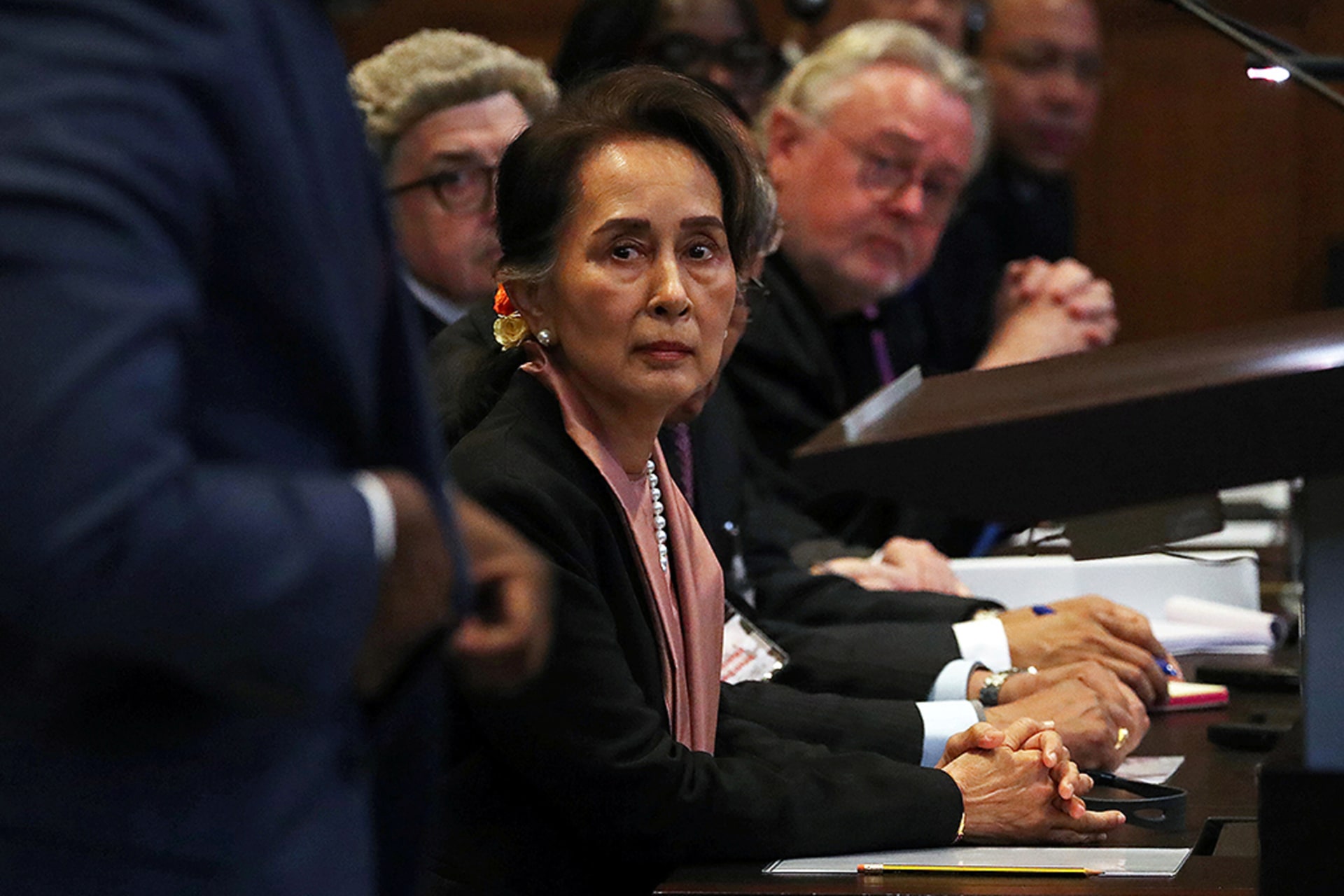Why the ICJ Is Trying to Protect Myanmar’s Rohingya
The International Court of Justice issued an important decision aimed at protecting Myanmar’s persecuted Rohingya minority, but its impact is unclear.

The wheels of international justice turn slowly, but this week they sped up to protect the rights of the Rohingya, an ethnic Muslim minority population in Myanmar that has suffered brutal assaults by government forces since 2016. The International Court of Justice (ICJ), the primary judicial organ of the United Nations, ordered Myanmar to cease and desist all forms of alleged genocide against the Rohingya and to preserve evidence about alleged genocidal acts. How Myanmar intends to respond to the ruling remains to be seen.
A Case for Genocide Takes Shape
UN fact-finding reports from the last two years recorded a multitude of atrocities, including mass killing and displacement and “overwhelming levels of brutality, combined with the physical destruction of the home of the [Rohingya], in every sense and on every level.” An estimated one million Rohingya fled across the border into Bangladesh, where they remain packed in vast refugee camps.
But does this violence amount to genocide? The ICJ is primed to answer that question in Gambia v. Myanmar, a case filed in November that seeks to enforce the UN Genocide Convention, a post-Holocaust treaty to which both nations are party.
The court’s order this week of “provisional measures” came swiftly after courtroom arguments were heard last month. Myanmar’s top political leader, Aung San Suu Kyi, who long ago fell from her Nobel Peace Prize perch, appeared in The Hague to argue the Myanmar government’s request to have the case dismissed and the provisional measures buried. The judges denied those demands.
Genocide is difficult to prove in a court of law. Despite the UN reports and graphic media coverage of the Rohingya crisis in recent years, Gambia’s legal team has a long road ahead to hold Myanmar responsible for genocide. However, the court’s order is a good start, as it resolves some of the underlying legal issues for the next phase of the case and aims to protect the Rohingya in the meantime.
Protecting the Rohingya
The ICJ embraced five of the six provisional measures sought by Gambia, marking a considerable victory at this stage of the case. The fifteen international judges and two ad hoc judges (one selected by each party in the case) emphasized that there are fundamental rights at stake and that the Rohingya deserve protection of those rights immediately. They noted a recent UN report that found the Rohingya “remain at serious risk of genocide.”
The court order requires Myanmar to prevent the full range of acts under the Genocide Convention that point to destroying all or part of a national, ethnic, racial, or religious group. These include not only killing members of a group such as the Rohingya, but also seriously harming them physically or mentally, “deliberately inflicting on the group conditions of life calculated to bring about its physical destruction in whole or in part,” or “imposing measures intended to prevent births within the group.” In a sweeping prohibition, the court ordered Myanmar to ensure that its military and any irregular armed units under its control will not commit any of these acts, form any conspiracy to do so, incite genocide, attempt to commit genocide, or be complicit in genocide. Myanmar also has to prevent the destruction of any evidence of possible genocide.
Do not bet the house on it, but by May 23 the Myanmar government must deliver a report to the court on all measures it has taken to implement the order, and it must continue to do so every six months thereafter until a final decision is reached. Myanmar recently claimed it is taking steps to establish accountability for human rights violations and war crimes—not genocide—against the Rohingya and to facilitate their return to Myanmar’s Rakhine State. But the court, relying on UN reports, decided that Myanmar’s anemic efforts are not enough to derail the case. Indeed, they found that Myanmar “has not presented to the court concrete measures aimed specifically at recognizing and ensuring the right of the Rohingya to exist as a protected group” under the convention.
The court’s jurisdiction in this case only covers the crime of genocide. The vast body of war crimes and crimes against humanity of which the Myanmar government and military have been accused has to be pursued in other forums, such as the International Criminal Court, which has its own Rohingya investigation underway.
Myanmar’s Weak Defense
The judges found that some of the worst atrocities allegedly committed against the Rohingya “are capable of falling within the provisions of the Convention.” This means genocidal acts may have taken place, and sets up the dispute required for the case to be argued on the merits.
- The court shot down Myanmar’s view that a “plausible claim” under the Genocide Convention must at this stage include evidence demonstrating specific genocidal intent. There need not be a showing of specific genocidal intent to destroy all or part of a protected group of people—which is difficult to prove on the merits—as a predicate to ordering provisional measures. Nor is it necessary to show that genocide is the only plausible reading of the facts to move ahead with such measures.
- The court ruled that it has jurisdiction over the case and that there is indeed a “dispute” between two states parties, Gambia and Myanmar. This is critical, because Myanmar had argued that Gambia sued Myanmar simply as a proxy for the Organization of Islamic Cooperation, which supports the judicial initiative to hold Myanmar accountable for assaults on the Rohingya. Gambia can sue in its own right as a state party to the convention.
- The judges found that the Rohingya “appear to be a protected group” to be shielded by the Genocide Convention.*
- The court also rejected Myanmar’s domestically popular claim, which was advanced in The Hague last month, that the ongoing internal conflict between armed groups, some aligned with the Rohingya, and the Myanmar military overshadows the nation’s obligations under the Genocide Convention. The existence of war, in the court’s view, is essentially irrelevant: “The context invoked by Myanmar does not stand in the way of the Court’s assessment of the existence of a real and imminent risk of irreparable prejudice to the rights protected under the Convention.”
A Test for International Justice
Diplomats, political leaders, and humanitarian agencies will have to keep up their fight to protect the long-suffering Rohingya. The provisional measures ordered by the court are legally binding on Myanmar. However, only the UN Security Council can enforce them, and the prospect of that happening is remote with possible vetoes from China and Russia.
So, as the case moves to the next stage and the court awaits Myanmar’s response in the months ahead, the force of the law itself will be severely tested.
*Editor’s note: This point was edited to clarify the court’s finding related to the protected status of the Rohingya.
